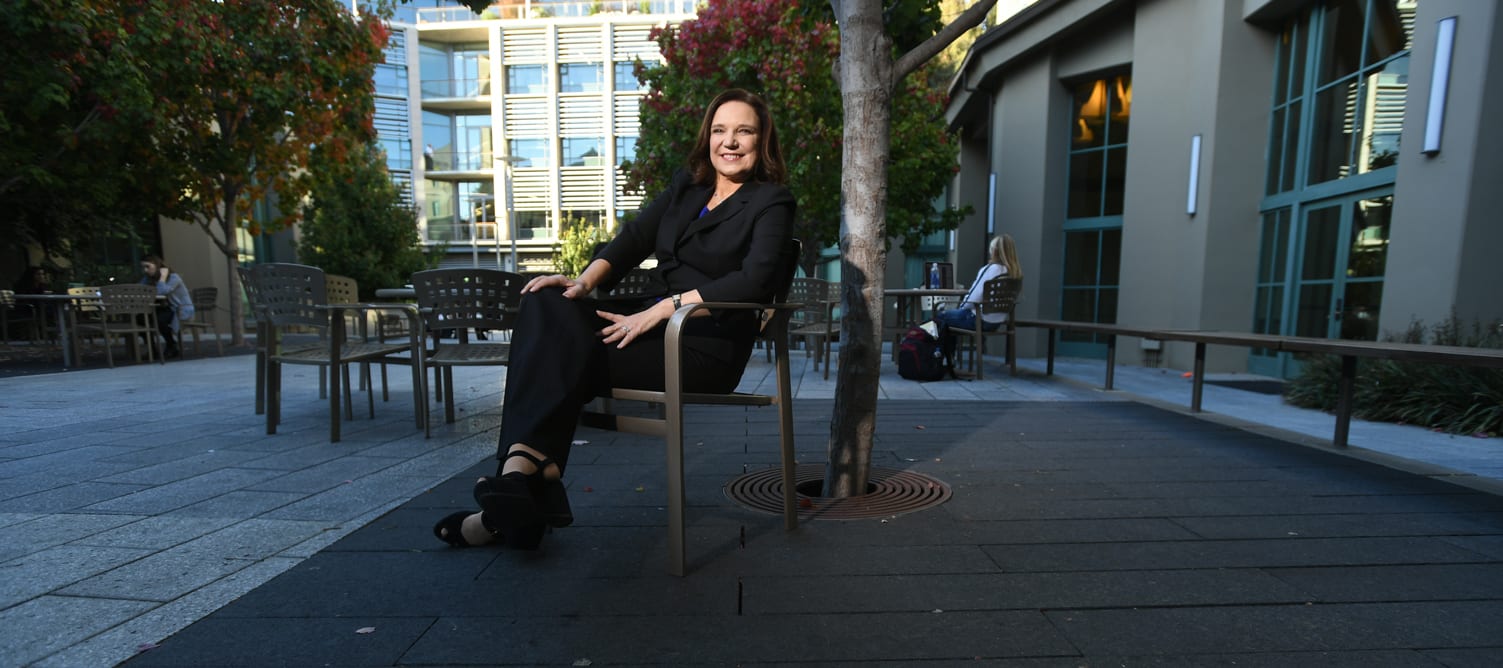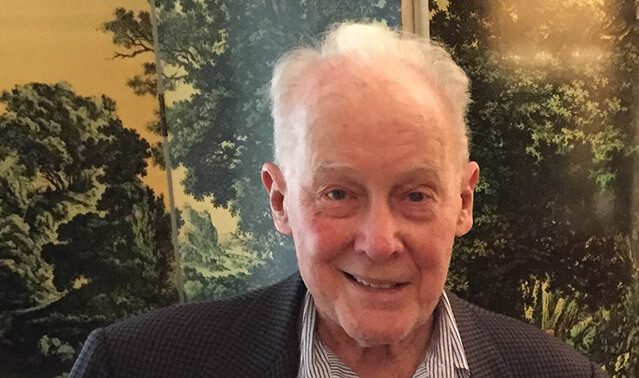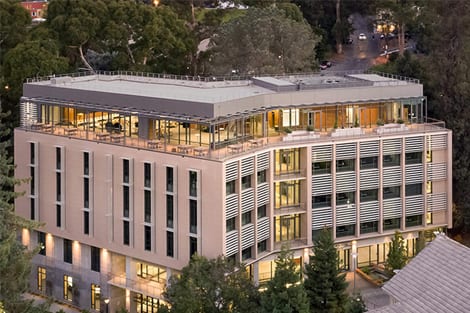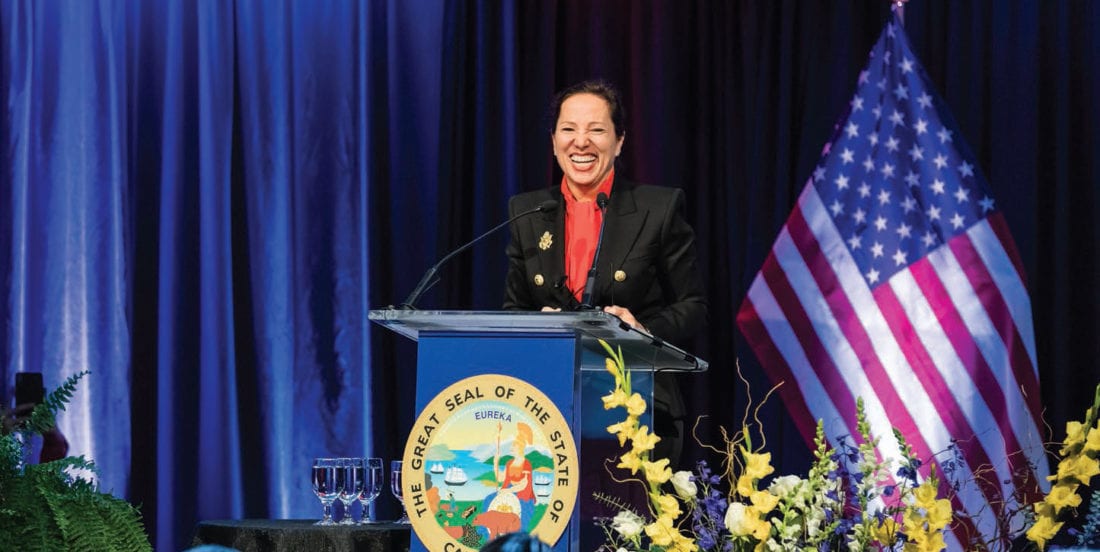James Ramsey Bancroft, MS 41
Ann Harrison grew up with an insatiable curiosity and a dream to make the world a better place. No surprise, then, that she ended up at Berkeley—first as a double major in history and economics and later, after receiving a PhD in economics from Princeton, as a professor in the Department of Agricultural & Resource Economics from 2001 until 2011. She then joined the World Bank as director of development policy and after that the Wharton School of Business, where she gained international acclaim for her research on foreign investment and multinational firms. On January 1, Harrison “came home” to Berkeley once more—this time to serve as the 15th dean of Berkeley Haas. She recently spoke to Berkeley Haas magazine about her early years on campus, her groundbreaking research, and her plans for strengthening Haas as a leader in 21st century business education.
What was your experience as a Cal undergrad?
Being a Berkeley student and growing up in the Bay Area pretty much shaped who I am today. I had an independent streak and had hiked all over California by the time I was in junior high. I remember campaigning door-to-door in support of a statewide ballot initiative to protect our coastline. When I came to Berkeley, I lived in a co-op on the North Side. I was—and still am—into modern dance and loved that I could take dance classes on campus from former stars with the Martha Graham company and go to Zellerbach Hall and see great performances. I wrote dance reviews for the Daily Cal and was elected to the ASUC senate.
How did you get interested in economics?
I started off as a history major with a plan to go to law school. But then I took economics and loved it. One day I saw a posting for someone to do the grading for Econ 101A and the professor, Leo Simon, hired me—although he was taking a bit of a risk since I was an undergraduate.He became my mentor and convinced me to get a PhD. He really changed my life. After collegeI became a health economist at Kaiser Foundation Health Plan. It opened my world to the power of data. Kaiser had millions of members, and I would stay in the office until 10:00 p.m., just analyzing the data.
How did your time at the World Bank shape you as a leader?
It taught me diplomacy, patience, and how people can do amazing things when they have the will to work together. After the financial crisis a decade ago, the bank’s lending tripled but its overall budget stayed flat. So, there was a lot of competition internally for fewer resources. The different parts of the bank were able to overcome that because of the strong relationships between people.
You are a much-cited scholar in your field. What inspires your research?
As a trade economist, I’m interested in real-world questions and their policy implications.What I find most interesting are big-picture policy issues. During my first business trip to India in 1986, I was part of a team that helped the Indian government formulate policies to increase competition and reduce monopoly power. To be able to take part in a project that helps economies solve problems in real time is very satisfying.
The question I have been most obsessed with recently is whether rising international competition has led to job losses and stagnating wages for the American worker—and whether free-trade economists miscalculated the costs of globalization or whether trade is just a scapegoat. I’ve concluded through my research that China is not the culprit. The cause of all those job losses is automation. The Factory-Free Economy, a book I co-edited with French economist Lionel Fontagné, looks at what will happen to high-income economies when many tasks become automated and jobs that used to exist are done by machines.
What motivated you to become dean of Haas?
Now is the time in my life when I have an opportunity to give back to the community that nurtured me. Leading Haas—a school where faculty research impacts public policy in areas ranging from energy to interest rates, where students and alumni are motivated to go beyond themselves to tackle some of the world’s biggest challenges—is an opportunity to do just that.
We recently moved up in the U.S. News and World Report rankings of full-time MBA programs to number six. Our undergraduate and evening and weekend MBA programs are both ranked number two. To remain a top-ranked business school as well as retain our public mission is very important to us. We seek to empower innovative leaders who will not just succeed but who will also create a more sustainable and equitable world. This public aspect to Haas creates an amazing energy. I find it incredible to be in a place where the faculty, students, and alumni are so inspiring.
People talk about social mobility and they talk about inequality being a huge problem in the U.S., but taking steps to address the problem is very challenging. At the undergraduate level, Berkeley and the other UCs are fulfilling their public missions by actually making a difference.The University of California system and the California State University campuses have a record percentage of students who are first in their families to go to college.
Finally, there is not enough diversity in leadership across both U.S. and non-U.S. business schools. If I have an opportunity to help change the landscape, how could I not take on this role?
What do you think of the Defining Leadership Principles?
I am a big believer in our principles. Now, more than ever, we need values-based leadership in every organization and at every level. I’ve been thrilled to see the Defining Leadership Principles thriving in our daily dialogue at Haas.
Are any of them especially resonant for you?
I’d say Students Always pretty much defines who I am. I love learning and have spent my career seeking opportunities to do that. Now that I’m here and in this position,Beyond Yourself resonates the most for me. I really want to serve Berkeley and the Haas community. Also, California is about Confidence Without Attitude, and that’s what I’ve also seen at Haas.
You’ve been on an extensive listening tour. What key priorities are emerging?
First of all, Haas is in excellent shape and credit for that should go to our beloved former dean, Rich Lyons. Rich worked with generous donors, alumni, students, faculty, and staff to create a healthy financial picture and make Chou Hall a reality. Our reputational ranking is at an all-time high, and we have unique qualities that set us apart from other U.S. business schools. But even though Haas has never been stronger, there are significant challenges on the horizon. There’s flattening demand for business school education at the graduate level. Is it a one-time or two-year phenomena? Or are we facing a transformation in the nature of business education?I believe education as we know it is changing dramatically. At Haas, we are questioning the status quo and betting on the innovation that comes from cross-disciplinary programs.
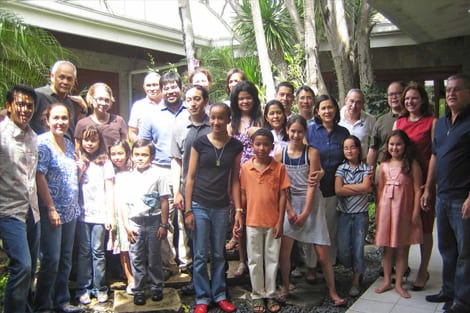
Harrison’s international backgroundsparked her interest in global economics. She grew up in France and married Vicente Madrigal, an economist from the Philippines. Shown top: Harrison, (second from right), Madrigal (third from right), and their daughters Alice (orange dress) and Emily (blue dress), with extendedfamily in the Philippines.
Why joint-degree programs?
A lot of major breakthroughs occur when you cross disciplines or find ways to get people from totally different viewpoints talking to each other.We are part of the Bay Area’s innovation economy, where tech is transforming nearly every industry, including food, health, finance, energy, real estate, and more. I think it’s important for our business students to have the opportunity to blend different perspectives from across Berkeley—by combining, for example, an MBA with a degree in engineering or law or public policy.
Haas has created three very successful undergraduate programs, such as the Management, Entrepreneurship,& Technology program with engineering. There’s a lot we can do at the graduate level. We already have graduate programs with law and public health that I’d like to expand. And we’re talking with the College of Natural Resources for students who want to find business solutions to environmental problems.
You’ve also identified faculty hiring as a top priority. Why?
Haas has the same number of ladder faculty today as it did nearly 30 years ago. Since then, the number of students at Haas has almost doubled.
I see an opportunity to increase research and teaching in three areas: entrepreneurship and innovation, data analytics, and sustainable business. A large percentage of our students pursue technology-related career paths. At the same time, big data, machine learning, and AI are changing the way companies operate and are leading to important questions about employment and societal impact and benefits. Also, it’s critically important that we find solutions to climate change, water scarcity, and our dependency on fossil fuels. These are likely to be defining challenges of the next 100 years—and Haas needs to be at the forefront of it all.
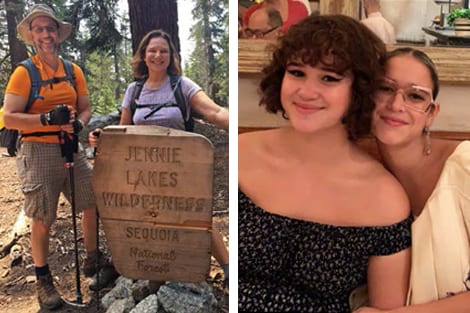
left: Harrison hiking with her brother, Laurent Harrison. right: Daughters Alice (18), a freshman at UC Santa Barbara, and Emily (23), a graduate studentat Williams in art history.
What approach do you plan to take to improve diversity, equity, and inclusion at Haas?
No organization can fix the challenge of diversity and inclusion overnight, but I’m committed to improving diversity within all six degree programs and to increasing opportunities at the alumni level.
We need a multi-pronged approach. We need to identify promising students from diverse backgrounds and get them to apply. Next, we need to make it a financial reality for them to come here. We need our alumni and our supporters to help us create an endowment so that financial assistance can be a permanent solution.
Energizing and increasing alumni engagement across all dimensions—gender, ethnicity, geography, and occupation—is critical. Most importantly, ensuring that all students feel welcome and that they belong here is something we are working on. The diversity, equity, and inclusion task force has made a lot of progress in identifying issues and we are addressing them at Haas.
What does it take to be a successful leader today?
You have to inspire others to do what is the right thing as a collective group. You need to be patient, persistent, and hard-working. It is also critical to have a supportive partner. Successful leaders often credit their spouses for standing behind them, rooting for them, pushing them to succeed. My husband has done that for me. Vicente has been a wonderful partner, and I wouldn’t be at Haas today without his support.
Posted in:
Topics:
